Department of Pharmacology
History of the department
HISTORICAL STAGES OF SCIENTIFIC, EDUCATIONAL AND SOCIAL ACTIVITIES
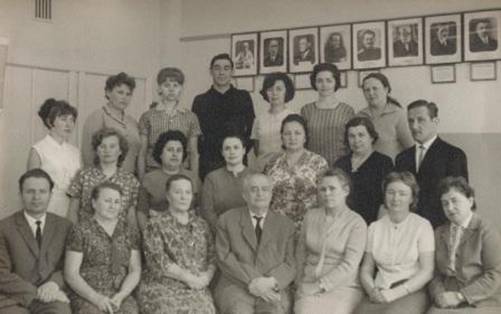
Staff of the Department of Pharmacology and Clinical Pharmacology, 1967
Bogomolets National Medical University
The Department of Pharmacology was established in 1841 among the first ten departments of the St. Vladimir University under the name “Medical substance science with a prescription writing”. Until 1884, the department was not separate, but merged with the Department of General Therapy.
The first head of this department was a graduate of Kazan University, Professor Kozlov Mykola Ilarionovich (November 14, 1814 – October 10, 1889)
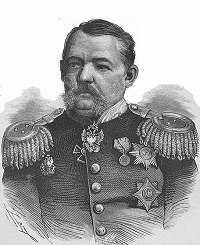
who taught anatomy, pathology, history of medicine, as well as pharmacology and prescription writing. The department conducted research on the problems of general pharmacology.
From 1849 to 1859 the department was headed by Professor Becker Vasil Vasyliovych (1811–28.03.1874), a graduate of the University of Dorpat (now it is called the University of Tartu), who initially worked as a professor in this department. With his direct participation, programs on general therapy, pharmacology and prescription writing were developed, as well as research was carried out to study the effects of mineral waters on the body. Furthermore, research in special pharmacology was conducted, for example, the pharmacological properties of metal salts, metalloids, alkalis and acids were studied.
After the retirement of Becker V.V. (1859) the department was headed by the famous anatomist and physiologist Walter Alexander Petrovich (28.12.1817-23.09.1889)
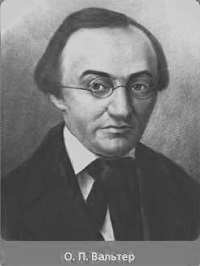
who was also a graduate of the University of Dorpat. He is better known as a physiologist, in particular for his work on the physiology of blood circulation and heat production.
In 1861–1865, the department was headed by a specialist in medical chemistry and physics, Schaeffer Oleksandr Oleksandrovych (1831–1897). Thanks to his initiative, both scientific and methodical work intensified. Scientific research of the department was devoted to the influence of inorganic compounds on blood and muscular activity.
On the basis of the University Statute of June 18, 1863, the Department of General Therapy, Pharmacology, Prescription Writing and Theory of Mineral Waters was established, and the position of associate professor of pharmacology, pharmacognosy and pharmacy was introduced. At this department, the position of associate professor of pharmacognosy and pharmacy, which was held by E.G. Nemeti (1827 – the date of death is unknown ) was also introduced.
O.O. Schaeffer was appointed as the head of the Medical Chemistry Department, and the teaching of pharmacology from 1865 to 1868 was carried out by Karl-Georgy-Emil Georgievich Geibel (September 25, 1839 – the date of death is unknown), who graduated in 1861 from the University of Dorpat. During this period significant contribution to the development of pharmacology of the Medicine Faculty was made by M.I. Pirogov, resulting in the formation of the main directions of this medicine branch. The famous surgeon had a special respect for pharmacology. This is due to the fact that M. I. Pirogov was one of the first in the world to use diethyl ether for analgesia in surgery, including in the fields, and he published the world’s first monograph on the properties of diethyl ether called “Practical and physiological observation of the action of ether vapors on animal organism ” in 1847.
A significant contribution to the development of pharmacology was made by a Ukrainian scientist born in Kyiv in a noble family Volodymyr Ivanovych Dybkovsky (1836–1870), who graduated with honors in 1858 from the Medical Faculty of Kyiv University. But in 1868 V.I. Dybkovsky was appointed as professor of pharmacology and general therapy at St. Vladimir University.
Due to the sudden death of V.I. Dybkovsky in 1870, Professor Peter Petrovich Sushchinsky (1842 – the date of death is unknown), who graduated from Moscow University in 1867, was appointed as the head of the department. His scientific works are devoted to the pharmacology of new drugs of that time. Professor P.P. Sushchinsky moved to Moscow and the Department of Pharmacology from 1876 to 1897 was headed by Professor K-G-E. G. Gable.
Scientific activity and methodical work were significantly intensified after the appointment of Laudenbach Julius Petrovich
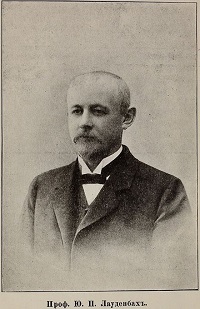
(10.01.1863-1910) as the head of the Department of Pharmacology in 1898, who graduated from St. Vladimir Kyiv University in 1889. From this period the department has been existing as a separate institution and is called the Department of Pharmacology.
After the transition of Yu. P. Laudenbach to the Department of Physiology in 1908, the position of the head of the Department of Pharmacology was given to Associate Professor Anton Trzhetsovsky in 1909, who headed the department until 1922.
A new creative rise of the department was noted in 1925 when Shkavera Grigory Lavrentievich (09.01.1884–3.12.1953), a student of the famous Russian pharmacologist, academician M.P. Kravkov., was appointed as the head of department. Simultaneously with his work at the Medical Institute G.L Shkaver headed the Department of Pharmacology of the Kyiv Veterinary Institute from 1925 to 1934,, and organized toxicological laboratories at the Kyiv Research Institute of Nutrition, the Research Institute of Occupational Hygiene and Occupational Diseases.
During the Great Patriotic War, the Kyiv Medical Institute was evacuated to Chelyabinsk, where systematic classes in pharmacology were held from September 1941. At that time, Associate Professor Geilig Fedir Isayevich headed and lectured in the Department of Pharmacology, laboratory classes were held by Assistant Serebryana Sofiya Hryhorivna.
From 1944 to 1971 Professor O.I. Cherkes headed the Department of Pharmacology of the Kyiv Medical Institute. During the Great Patriotic War he was appointed as a chief toxicologist of the USSR. O.I. Cherkkes`s monograph “Fundamentals of toxicology of chemical war gases” has been published 7 times. The last seventh edition, significantly supplemented, was published according to the decision of the USSR Council of People’s Commissars in 1943.
During 1971-1972, the department of pharmacology was headed by Professor Dmitrieva Neonila Mikhailovna (11/18/1910-07/09/1986),
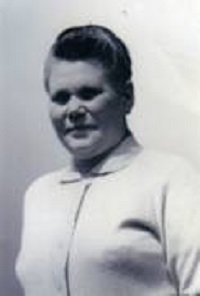
N.M. Dmitrieva paid attention to the influence of cardiac glycosides on various aspects of energy metabolism in modeling pathological conditions of the cardiovascular system.
From 1972 to 2016, the Department of Pharmacology and Clinical Pharmacology was headed by corresponding member NAS and NAMS of Ukraine, MD prof. Chekman Ivan Sergeevich (03.10.1936-26.10.2019). During this period, the members of the department worked on solving a wide range of topical issues of general, special, clinical, biochemical, radiation, environmental, physicochemical, quantum pharmacology, nanopharmacology, phytopharmacology and phytotherapy. The department became a “forge of personnel” for universities, received the status of a support department.
In 1981, the Department of Pharmacology started teaching a course in clinical pharmacology, which at that time was rapidly developing in the whole world. In 1983, Oleksiy Pavlovych Viktorov, MD, Associate Professor, was appointed Head of the Clinical Pharmacology Course. Scientific activity of O.P. Viktorov as a pharmacologist was devoted to the study of the peculiarities of the reaction of biochemical structures of the myocardium to cardiac glycosides and the effect of adrenergic and antiadrenergic drugs on the body of rats. From that time he became one of the founders of the development of clinical pharmacology, and later the system of pharmacovigilance in Ukraine. Having introduced a number of innovations useful for researchers, Oleksiy Pavlovych joined the creation of the Pharmacological Committee of the Ministry of Health of Ukraine, holding the position of his deputy (1992–1995). In the newly created scientific-expert organization, an experienced clinical pharmacologist he was assigned to head the Center for Drug Side Effects (1999–2008). Thanks to the knowledge, experience, energy and consistency of Oleksiy Pavlovych Viktorov in a short period of time in the country a modern system of pharmacovigilance was created, which was recognized by the WHO. Since 1984, the department became known as the Department of Pharmacology and Clinical Pharmacology, and since 2000 – the Department of Pharmacology with a course in clinical pharmacology. Since 2014, the department has been divided into 2 parts. The Department of Clinical Pharmacology and Clinical Pharmacy was separated, headed by Professor M.V. Khaitovych. After that, the department was renamed the Department of Pharmacology.
Since 2016, the Department of Pharmacology of Bogomolets NMU is headed by Doctor of Medicine prof. Zaychenko Ganna Volodymyrivna (b. 1967) – a graduate of Kharkiv National Medical University, who since 1991 worked at the Department of Pharmacology (assistant, associate professor, professor), and from 2011 to 2016 was the head of the Department of Clinical Pharmacology at the Institute of Advanced Training specialists in pharmacy at the National University of Pharmacy (Kharkiv).
During this period, the main task for the department was to update curricula for medical and pharmaceutical education, harmonization of the content of teaching pharmacology with a focus on evidence-based medicine, national and world, European standards of treatment.
All this has led to improved quality of the educational process and student success. In 2017, the Department of Pharmacology in the discipline “Pharmacology” took first place among the disciplines at other departments of the university in all faculties according to the results of the LIE “Step-1”. Since then, according to the results of the licensed exam in all specialties and faculties, the discipline “Pharmacology” is among the top three.
Current challenges: increasing state requirements for the quality of education with a constant reduction of contact hours and increasing the share of independent work of students, introduction of a single state qualifying exam (SSQE), revision of educational programs focusing on new competencies, harmonization of clinical guidelines and treatment protocols with international standards. renewal of the world drug market and dynamic changes in the National List of Medicines, development of the pharmacovigilance system, implementation of methods for evaluating new their medical technologies, reimbursement, electronic prescriptions, etc.
The answer to today’s challenges is educational innovations, which are inevitable, they are gradually changing both teachers and students. Based on this, the Department of Pharmacology of Bogomolets NMU has been introducing new teaching methods for the last three years, including interactive (widely used interactive whiteboards, interactive testing system during lectures), simulation (during practical classes students use real prescription forms, collection of medicines, models, reference books), case technologies (teaching based on clinical cases). Together with the clinical departments, the list of drugs to be studied and submitted for final control of knowledge / exam has been revised. Updated curricula, published new manuals, including medical prescriptions, guidelines for preparation for practical classes, licensed integrated exam “STEP-1”. Radical changes have taken place in the methodology of teaching lecture material. The form of the lecture was standardized and the content was “rigidly” reviewed. The presentations are adapted to the 45-minute format of the lecture, their structure is unified. Taking into account the world trends in the development of pharmacology and medical education, elements of digitalization (wider use of digital technologies and gadgets, e-learning), gaming (introduction of game forms of learning) and smart technologies are introduced into the educational process. We proposed these approaches for all related departments during the annual meetings with colleagues.
So, awareness of new circumstances of development dictates the appropriate pace of change and improvement. We hope that these measures will help to bridge the gap between the existing challenges and needs of modern medicine in doctors and pharmacists of the new generation, knowledgeable in pharmacology, pharmacovigilance and able to provide effective and safe pharmacotherapy.



